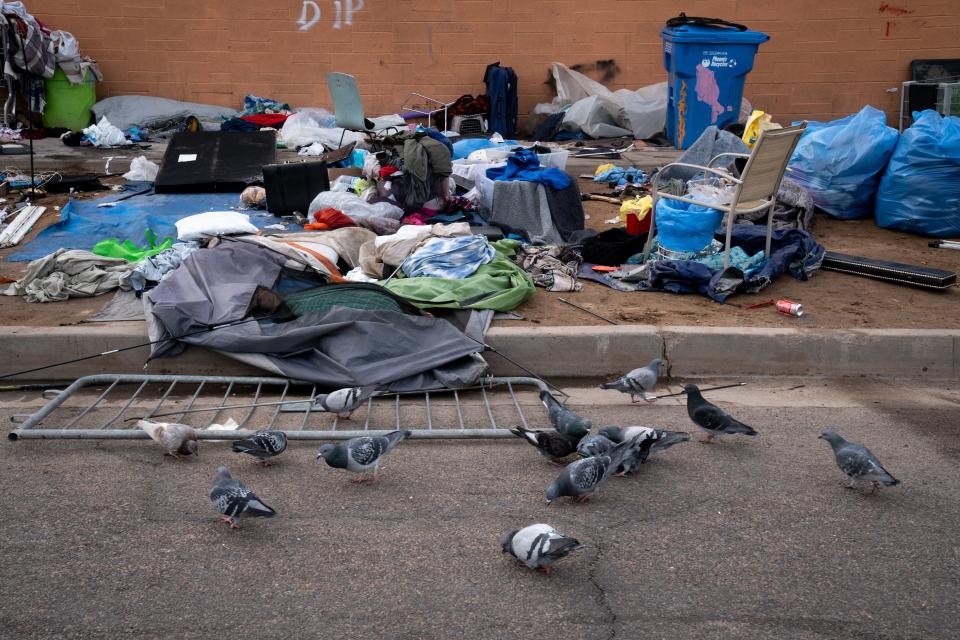How Phoenix can hold homeless people accountable and be compassionate
Phoenix has been walking on eggshells, and with last week’s ruling contradicting the 9th U.S. Circuit Court of Appeals, it’s starting to feel more like pins and needles.
How did we go from farmers markets in our parks to open air drug markets?
How did we go from utilizing our alleys for bulk trash removal to bulk encampment removal?
How did we arrive to nearly 1,000 people camping and otherwise loitering around an entire city block?
Phoenix went soft on crime in public spaces.
Phoenix has done a lot to prevent crime
Now, don’t get me wrong, Phoenix has done a lot of smart and innovative things to prevent crime and provide services to those in need:
We expanded the Gated Alley program, which closes off qualifying alleyways from public use.
We grew a pilot program of overnight private park security from three downtown parks to 15 across the city.
When encampments started popping up along SRP’s Arizona Canal, I worked with SRP and the Bureau of Reclamation to change federal policy to no longer allow camping along canals in urban environments.
On the services side, the city has:
Added 475 new shelter beds in 2022, with 769 new beds in our pipeline set to open over the next two years.
Expanded our contracts with outreach service providers and invested more into our Community Action Response Engagment Services (CARES) program, a coordinated response to homelessness.
Engaged 710 individuals through the CARES team in 2022 to offer services and shelter for at least the night.
Being homeless is not a crime

However, not everyone we engage with accepts services.
Some people just want to be homeless, and per the U.S. Supreme Court decision to not hear Boise’s challenge, they have the right to be homeless.
But where does one’s right to be homeless supersede a child’s right to a safe environment in their local park or a business owner’s right to operate in a safe environment where their customers don’t fear for their lives?
Being homeless is not a crime.
But obstructing the right of way is a crime. Smoking fentanyl and ingesting drugs are a crime. Ignoring park rules and littering it with drug needles, paraphernalia and soiled clothing is a crime.
Urinating or defecating in public is a crime. Stealing shopping carts from stores is a crime.
But we don’t have to, nor should we, lock everyone up.
We also don't have to be hands-off
Many of these crimes are a result of an individual’s circumstances. My office has spent the better part of a year researching the root causes of homelessness, how we can work to prevent homelessness, and how we can get these folks out of the situations they find themselves in.
We’ve met with numerous service providers from faith-based to secular nonprofits. We’ve spoken to other cities and towns to learn best practices. And we think we’ve found a good one.
After homeless ruling: Mayor stresses indoor solutions
I agree with Maricopa County Superior Court Judge Scott Blaney. I believe we are misinterpreting the Martin v. Boise ruling.
There must be a way where we can enforce our laws and follow Judge Blaney’s ruling while also staying in line with the 9th Circuit’s Martin decision.
Enter community courts.
Mesa has a court system we should consider
Mesa has an award-winning prejudicated community court system designed to lift folks out of homelessness in a smart and thoughtful process.
Rather than cite individuals and put them through the judicial process, Mesa’s Community Court offers them navigation assistance and a personalized plan to get out of homelessness.
Should they choose not to follow the plan to graduate from community court, the city will then process the citation.
People are given a choice: Take steps to help lift themselves out of their current environment or be held responsible for their unlawful actions. Those who graduate from Mesa’s court program have a recidivism rate of less than 7%.
Phoenix needs something like Mesa’s court setup.
We need to find a way to comply with Judge Blaney’s order, stay in line with the 9th Circuit and hold accountable the illegal actions of all our citizens. Community courts is that answer.
Every citizen deserves a standard quality of living. It is our obligation as a city council to provide that and nothing less.
Ann O'Brien represents northeast Phoenix in District 1 on the Phoenix City Council. Reach her at District1@phoenix.gov; on Twitter: @CWAnnObrien.
This article originally appeared on Arizona Republic: Phoenix can hold homeless people accountable and be compassionate

